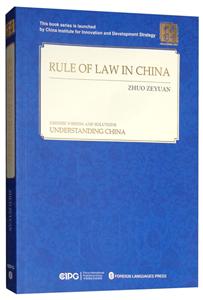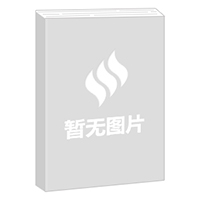-
>
法律的悖論(簽章版)
-
>
中華人民共和國憲法
-
>
中華人民共和國勞動法
-
>
私人財富保護、傳承與工具
-
>
再審洞穴奇案
-
>
法醫追兇:破譯犯罪現場的156個冷知識
-
>
法醫追兇:偵破罪案的214個冷知識
RULE OF LAW IN CHINA-中國的法治之路-英文 版權信息
- ISBN:9787119117249
- 條形碼:9787119117249 ; 978-7-119-11724-9
- 裝幀:一般膠版紙
- 冊數:暫無
- 重量:暫無
- 所屬分類:>
RULE OF LAW IN CHINA-中國的法治之路-英文 內容簡介
The book gives a chronological account of major legal developments and the rule of law in China, covering botlh setbacks and successes. It is a condensed history of the rule oflaw in China, vividly examining in depth the rule of law course.
RULE OF LAW IN CHINA-中國的法治之路-英文 目錄
Part Ⅰ Difficult Start
Chapter 1.Prelude and Resonance of History
Chapter 2.From “Competition of a Hundred Schools” to “Supremacy of Confucianism”
Chapter 3.Reflection and Rebirth in Tribulation
Chapter 4.Shen Jiaben: Founder of Modern Law in China
Chapter 5.Wu Tingfang: First Generation Jurist in Modern China
Chapter 6.Kang Youwei and Liang Qichao
Chapter 7.Law Enactment in Late Qing Dynasty: Transition from Ancient
Law to Modern Law
Chapter 8.Overseas Study of Constitutional Monarchy
Chapter 9.Six Codes
Chapter 10.Red Jurists
Chapter 11.Great Charter of the People
Chapter 12.Ma Xiwu Style of Trial
Chapter 13.Tokyo War Crimes Tribunal: Justice Prevails
Part Ⅱ Constitutional Foundation Laid
Chapter 14.Determination of Legal Principles
Chapter 15.Establishment of the Central People’s Government
Chapter 16.First Legislation of the People’s Republic of China:The Marriage Law
Chapter 17.Land Reform Law and Agricultural Cooperation
Chapter 18.Five Principles of Peaceful Coexistence
Chapter 19.First National People’s Congress
Chapter 20.First Constitution of the People’s Republic of China
Chapter 21.Suspension of the Rule of Law
……
Part Ⅲ Renewal of the Rule of Law
Part Ⅳ FundamentalPrincipleEstablished
Part Ⅴ Fulllmplementation
Conclusion: A Long Way to Go
RULE OF LAW IN CHINA-中國的法治之路-英文 節選
In October 1932, Chen Duxiu, the first general secretafy of theCommunist Party of Cluna, was arrested by the Nationalist authorities.Chiang Kai-shek telegraphed to related parties: “Chen has committed acrime of endangering the Republic of China and should be handed ovefto a court for punishment in honor of justice.” On April 14, 15 and 20,1933, the Jiangsu High Court held three public trials of Chen Duxiu. In court, the prosecutor accused Chen of “advocating the overthrow of the NationaList government, which served the same purpose as the proletarian dictatorship, both for communism and against the Republic in legal viewpoint.” Pursuant to Article 6 and Article 2.2 of the Emergency Law for Punishing Crimes against the RepubLic of China, Chen Duxiu was accused of the felony of endangering the Republic and treason. Chen Duxiu made excellent defenses on these two charges. In response to the charge of endangering the Republic, Chen de-fended himself by saying, “I admit that I was against the Nationalist Par-ty and its government, but I don't think I was endangering the Republic.The government is not the state. Being against the government is not the same as endangering the state.” He said that he was against the govern-ment for several reasons: “First, people are not free. Second, corruption runs unchecked. Third, the government is not fully devoted to resist-ing Japanese aggression.” In the end, he concluded: “The prosecutor's charges afe groundless and I should be acquitted in court.” In response to the charge of treason, Chen retorted: “What consti-tutes a state? It is the combination of land, people and sovereignty. If a state perishes, it always means losing the land, people and sovereignty to a foreign invadef. Therefore, the state does not perish if one party takes the place of another in a country.” On the felony of treason, Chen as-serted: “There is a specific definition of the crime in the criminal code.It cannot be defined in abstract terms arbitrarily. If one thinks that the government and the state are the same, and that the one in power is the state, then there would be no reason for modern law scholars to de-nounce Louis XIV, the king of France, for his absolute monarchical rule,proclaiming 'I am the State!' If the opposition party should be accused of treason with its call for the overthrow of the ruling party that is not loyal to the state, that infringes upon civil rights, then all the revolutionary parties around the world should have committed the crime in history, including the Nation-alist Party.” ……
RULE OF LAW IN CHINA-中國的法治之路-英文 作者簡介
卓澤淵,Zhuo Zeyuan is professor at the Southwest University of Political Science and Law, executive director of the China Law Society, and vice president of the China Association for Legal Ed-ucation, the Legal Theory Research Society of China, and the China Behavior Law Association. He was listed in the second group of Top Ten National Outstanding Young Jurists and in the first group of Leading Talent in Philosophy and Social Sciences under t,he Nationai'ren-thousand Talent Plan. He gave legal lectures to the study group of the Political Bureau of the 16th CPC Central Committee in June 2006, and that of the 17th CPC Central Committee in March 2011. In August,2015, he spoke at a press conference on the rule of law during the activities commemorating the 70th anniversary of the victory of the Chinese People's War of Reslstance Against Jap-anese Aggression. His major publications are The Theory of the Value of Law, Research on the Politics of Law, and On Countries Under the Rule of Law.
- >
回憶愛瑪儂
- >
我從未如此眷戀人間
- >
煙與鏡
- >
有舍有得是人生
- >
龍榆生:詞曲概論/大家小書
- >
山海經
- >
羅曼·羅蘭讀書隨筆-精裝
- >
自卑與超越

















